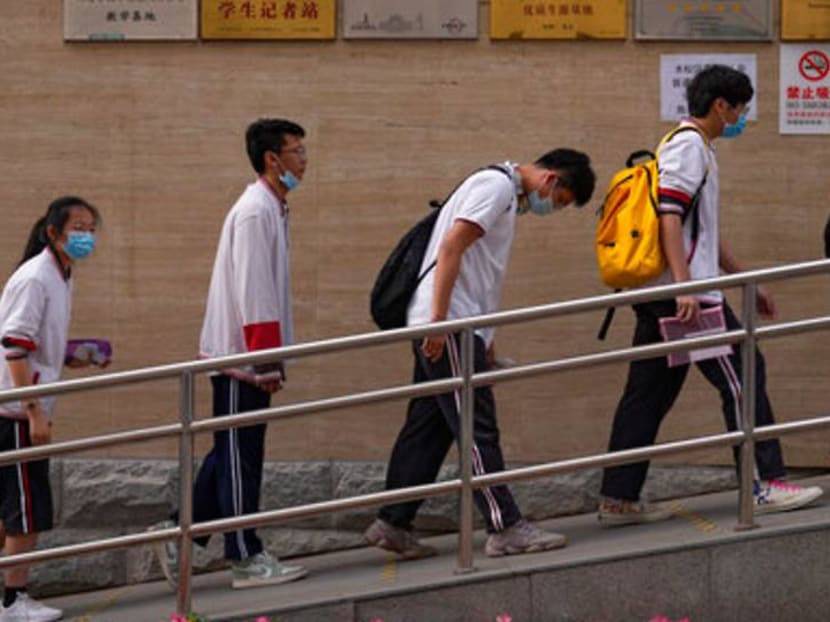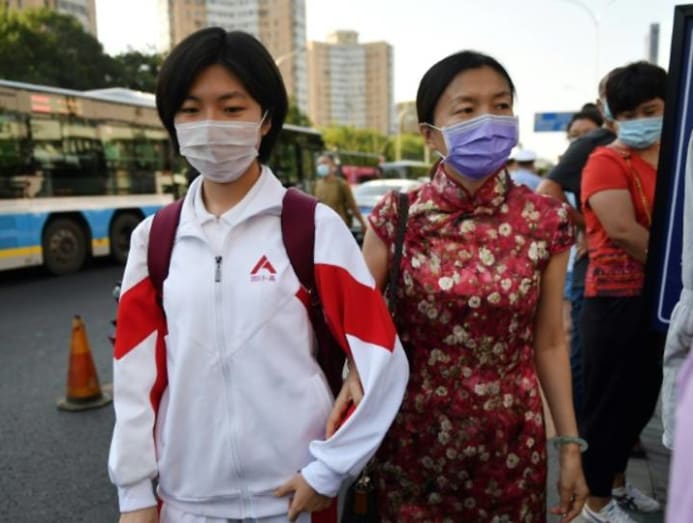Commentary: Chinese youth want to 'lie flat'. Authorities are taking them seriously
That Beijing is willing to administer a mortal blow on the US$100 billion private tuition industry shows how seriously it takes the problem, says the Financial Times' James Kynge.

(Photo: AP)
HONG KONG: China’s social contract is fraying, and a song deleted from the country’s Internet captures the problem vividly.
“Lying flat is good, lying flat is wonderful, lying flat is right, lie down so you don’t fall,” Zhang Xinmin sings in Chinese as he lies on a sofa strumming a guitar.
“Lying flat”, a trend among young Chinese to opt out of stressful jobs, represents the antithesis of a development model that has delivered extraordinary growth over four decades by enlisting the maximum effort from its people.
Beijing is more than a little perturbed. “In this turbulent era, there is no such thing as lying flat and waiting for prosperity,” said Wu Qian, an official spokesman, this week. “There is only the splendour of struggle and endeavour. Young people, come on!”
READ: Commentary: In China, authorities fear wanting to chill could fire off the next youth revolution
Such concerns lie behind several initiatives to galvanise people and encourage families to have more children. Crucial among these moves was the decision last week to clamp down on after-school tutoring, a US$100 billion business that heaps stress upon school children while taxing the finances of their parents.
New rules issued by the State Council, or cabinet, ban for-profit tutoring in core school subjects. The news hit like a thunderbolt, driving down the share prices of US-listed industry leaders TAL Education, New Oriental and Gaotu Techedu.
The antipathy of Xi Jinping, China’s leader, toward after-school tutoring had been telegraphed. In March, he criticised a “mess” in the sector and called it a “chronic disease that is very difficult to cure”.
READ: School's out? Tuition curbs pile on the anxiety for China's parents
CITY LIFE BECOMING A HAMSTER WHEEL
But the fact that Beijing has been willing to administer what could be a mortal blow to an industry that employs hundreds of thousands of staff reveals how seriously it takes the problem.
For tens of millions of middle-class people in China’s large cities, life has become a hamster wheel of increasing effort and diminishing reward. A welter of costs for housing, education, healthcare and other expenses are rising faster than average salaries, giving many people the sensation of running to stand still.
“The latest measures to bring down after-class tutorial companies are in line with the shift of focus to the Chinese population’s quality of life,” says Yu Jie, senior research fellow at Chatham House, a London-based think-tank.

According to figures from the Chinese Society of Education, the average annual cost of tutoring for a student is more than 12,000 yuan (US$1,860), more than an average month’s salary in a country with a 2019 per capita gross domestic product of US$10,216.
Some families, however, spend as much as 300,000 yuan a year for tutoring in well-known schools by famous teachers. Such a burden is often exacerbated by the need to pay for childminders while both parents work long hours in office jobs and contend with snarled rush-hour traffic.
Parents who elect to live in the catchment area of sought-after schools in cities such as Shanghai pay extortionate amounts for the privilege.
“We paid over 3 million yuan for our place,” says Yang Liu, a mother in Shanghai who leaves home for work at 6.30am and does not return until shortly before her six-year-old daughter goes to bed at 9pm.
Even though kindergartens are officially discouraged from setting after-school work, her daughter gets homework for every day of the week. She must learn Chinese characters, English words, memorise poems, practise reading and play the violin.
READ: Commentary: Fretting about your child going to Primary 1? Here’s advice from a principal
READ: Commentary: Parents play an outsized role in academic stress children face
DELAYED MARRIAGES, FALLING BIRTH RATES
The stress that such lifestyles display to unmarried young people has an impact beyond inducing some of them to “lie flat”. Statistics show that couples are getting married later and the birth rate is falling precipitously.
In 2020, only 12 million babies were born, down from 14.65 million a year earlier.
With the number of women of childbearing age (22 to 35) due to fall by more than 30 per cent over the next decade, some experts are predicting the number of babies born could drop to below 10 million a year and China’s fertility rate could become the lowest in the world.
The realities of daily life for China’s middle class presents a different image from that offered by the inexorable rise of headline GDP figures. The cost of living in big cities has risen sharply, shrinking people’s disposable incomes.
Alicia Garcia Herrero, chief economist for Asia Pacific at Natixis, an investment bank, puts it succinctly: “The bulk of China’s population is doing worse in net terms as housing affordability continues to worsen and access to education and health becomes more and more costly.”



